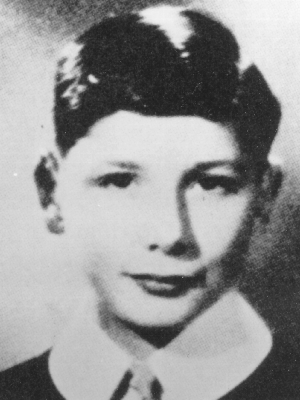
Georges Kohn, the youngest of four children, grew up in Paris, France. His father, Armand Kohn, was a relative of the banker, Rothschild, and the director of the Baron de Rothschild Hospital in Paris, the largest Jewish hospital in France. Georges was an eight year-old schoolboy when the Germans occupied paris in June 1940. His family was wealthy and close-knit. Because of his father's connections and position, his family was exempted from the harsh restrictions placed upon the Jews of Paris under German rule.
The Germans began deporting the Jews of France to death camps in the summer of 1942. Georges's father hid many Jews in his hospital on the pretense that they were seriously ill. The head of the secret police, Alois Brunner, had frequently visited the hospital, and Georges's father counted on their personal relationship to protect his family from deportation. During the last week of the German occupation of Paris, Brunner himself came to Georges's home and arrested the family. Less than one month later, twelve year-old Georges, his grandmother, mother, father, his older sisters, Rose-Marie and Antoinette, and his eighteen year-old brother, Philippe, were put on a train to be deported to the Buchenwald concentration camp. Three days after the train began moving, Rose-Marie and Philippe broke the bars of the freight car's small window and jumped out. They managed to avoid capture. When the train arrived at Buchenwald, the family was separated. Georges and his grandmother were sent to the Auschwitz death camp.
At the selection in Auschwitz, Georges was sent to a special barracks. The 20 Jewish children in this barracks were to be used in horrific medical experiments. For this reason, the barracks was heated and the children were provided with decent food. The staff sang the children songs, taught them games, and distracted them from the horrible smells of the crematorium. Most of the children spoke only Polish, but Georges found one child who spoke French and they became close friends.
In November 1944, the children were transferred to the Neuengamme concentration camp near Hamburg, Germany. Soon after their arrival, Georges and the rest of the children were injected with tuberculosis cultures and became extremely ill. On April 20, 1945, when the British were less than three miles from the camp, all 20 children were brought to a school in Hamburg. The children were injected with morphine and murdered.